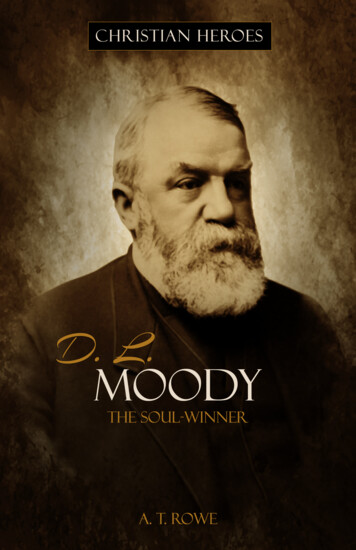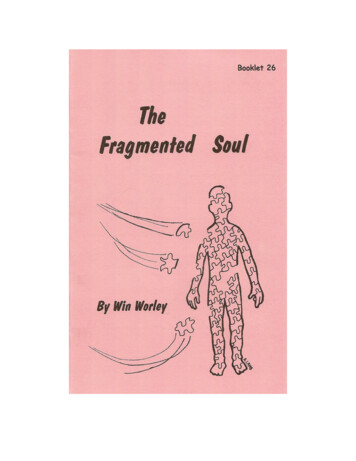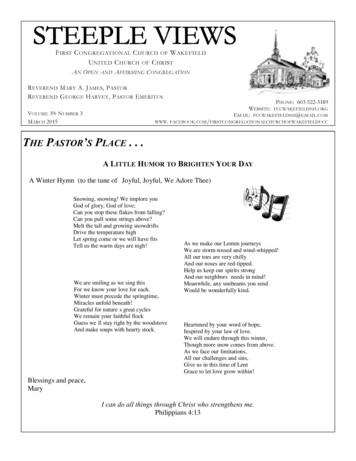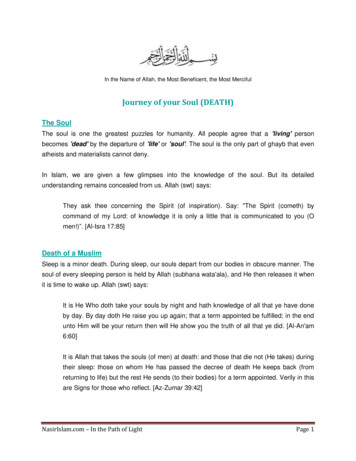
Transcription
D. L. MOODYTHE SOUL-WINNERByA. T. RoweDigitally Published byTHE GOSPEL TRUTHwww.churchofgodeveninglight.com
Originally Published byGospel Trumpet Company1927
D.L. Moody
IntroductionThe name of Dwight L. Moody stands at the head of the list of“lay” preachers of all time. His son, William R. Moody, says ofhim, “Father lived solely for the glory of God and for the spreadof the gospel of Jesus Christ.” No man could be paid a greatertribute than this. His entire ministry was devoted to soul-saving.Soul-winning demands Christian heroism of the highestorder. May the reading of this biography inspire the reader, be heyoung or old, with a deep desire to become a soul-winner.And may it especially call forth a hearty response from ourwealth of young people, to the call of the Master: “Go work todayin my vineyard.”The Publishers
ContentsChapterPageI.Ancestry and Early Life .1II.Home and School Life .6III.Conversion in Boston .10IV.In Chicago .15V.Enters the Ministry .21VI.In the Civil and Spanish American Wars .26VII.Moody and Sankey .30VIII.Burned Out in the Chicago Fire .34IX.In England, Scotland, and Ireland.38X.General Evangelistic Work .43XI.Founds Educational Institutions .47XII.In Palestine .51XIII.Secrets of Success .55XIV.Moody the Preacher .60XV.Anecdotes .65XVI.Incidents and Illustrations .71XVII.Last Work and Illness .77
XVIII.Closing Days .82XIX.Summary of His Life and Work .86XX.A Sermon by D. L. Moody .88
Chapter IAncestry and Early LifeWhen asked concerning his ancestry Mr. Moody replied:“Never mind the ancestry! A man I once heard of was ambitious totrace his family to the Mayflower, and he stumbled over a horsethief. Never mind a man’s ancestry!” Of his birth he said: “I wasborn of the flesh in 1837. I was born of the Spirit in 1856.” Mr.Moody was born in Northfield, Mass., on Feb. 5, 1837; wasconverted in Boston, Mass., in 1856; and died in Northfield, Mass.,on Dec. 22, 1899. He was the sixth child of a family of nine, comingof hardy, conscientious Puritan stock.Mr. Moody, like many of our Christian heroes, was born andreared in poverty. His father died at forty-one, leaving the widowwith practically no means of support and with the homesteadencumbered with a mortgage. The creditors took everything thatthey could secure, even to the kindling wood in the shed, and leftthe widow with her seven children in hard straits. The firewoodbecame exhausted; the children remained in bed until school time tokeep warm. A brother of Mrs. Moody then came to their rescue withwhat Dwight thought was the biggest load of wood that he had everseen. The uncle split it, and soon they had a good fire. The birth oftwins after the father’s death added to the heavy burden of the
D. L. MOODY, THE SOUL-WINNERmother and she was advised to break up the home and put thechildren out among different families for keeping. But “Trust inGod” was the simple creed of this mother. Early in life the childrenlearned to love that God and to pray to him who is the strength ofthe fatherless and the widow.With the sole care of a large family there was little of religiousdoctrine taught in the home, but the children were instructed in thetrue heart religion, “Seek God first and his righteousness.” Dwight,at seventeen, as a member of a young men’s Bible class in Boston,was bewildered and embarrassed by the request to find a simpleScriptural reference, yet few if any of his amused companions weremore thoroughly established in the “pure religion” than he. He wasnot converted until he was eighteen, but it was to a tender conscienceand an open heart that the gospel invitation was given, and Dwightwas ready to honor God and accept his salvation.Mrs. Moody was tender-hearted. She taught the children theprivilege of giving from their scanty store. The hungry were neverturned away and once when the provision for the evening meal wasvery meager it was put to vote of the children whether they shouldshare their food with a poor beggar who had appealed for aid. Theyvoted to aid him and offered to have their own slices cut thinner. Nofault-finding or complaining about neighbors was tolerated; thus thechildren learned independence as well as charity. No matter howinexcusable the neglect not one word of complaint was heard fromany member of the family.Church attendance was compulsory. The boys went barefoot,carrying their shoes and stockings in their hands and putting themon when they came in sight of the church. They carried luncheonand remained all day at church hearing two long sermons andattending Sunday-school in between. In spite of the poverty that2
D. L. MOODY, THE SOUL-WINNERDividing with the Beggar3
D. L. MOODY, THE SOUL-WINNERparted the children and mother through the week, they all camehome for Sunday, and thus the mother preserved the home life andreligious training one day in seven.In later years Mr. Moody looked back to these days withgratitude, even though he had been compelled to attend church andlisten to sermons which he could not understand, for it fixed uponhim the habit of attending God’s house. Of these times Mr. Moodysaid: “I remember blaming my mother for sending me to church onthe Sabbath. On one occasion the preacher had to send someone intothe gallery to wake me up. I thought it was hard to have to work inthe field all the week, and then be obliged to go to church and heara sermon I didn’t understand. I thought I wouldn’t go to church anymore when I got away from home; but I had got so in the habit ofgoing that I couldn’t stay away. After one or two Sabbaths, backagain to the house of God I went. There I first found Christ, and Ihave often said since: ‘Mother, I thank you for making me go to thehouse of God when I didn’t want to go.’ ”Three books constituted the home library—a large familyBible, a catechism, and a book of devotions. From the latter a portionwas read each morning, also a prayer was made before the familyentered upon the work of the day. Mr. Moody could never speak ofthose early days without the most tender reference to that bravemother whose self-sacrifice and devotion had sacredly guarded thehome entrusted to her care. When at the age of ninety, her lifevoyage ended, she entered the “Haven of Rest,” her children, herchildren’s children, and the entire community rose up to call herblessed. To rule a household of seven sturdy boys and two girls, theeldest twelve years old, required much more than ordinary tact andjudgment, but this loyal mother was so discreet that she made homethe most loved place on earth to her family and so trained her4
D. L. MOODY, THE SOUL-WINNERchildren as to make them a blessing to society. “For nearly fiftyyears I have been coming back to Northfield,” said Mr. Moody, longafter the circle had been broken up, “and I have always been glad toget back. When I get within fifty miles of home I grow restless andwalk up and down the car. It seems as if the train will never get toNorthfield. When I come back after dark I always look to see thelight in mother’s window.”Thus the noble blood that coursed through his veins, the carefuldiscipline, the early, persistent religious training, the influence of agodly mother, the hardships and privation which he endureduncomplainingly, laid the foundation for D. L. Moody, doubtless thegreatest “lay” preacher of all time. It is conservatively estimated thatduring his ministry he preached the gospel to more than fifty millionpeople in England, America, Scotland, Ireland, and the Holy Land.It has been said that his life and word glorified the ministry.5
Chapter IIHome and School LifeThe mother of Moody was kind and loving, but she was a strictdisciplinarian and order was enforced with old-fashionedwhippings. These were frequent in the case of Dwight, for he wasthe leader in all sorts of boyish mischief. He said: “Mother wouldsend me out for a stick, and I thought I could fool her and get a deadone. But she would snap the stick and then tell me to get another.She was rarely in a hurry, and certainly never when she waswhipping me. Once I told her that the whipping did not hurt at all. Inever had occasion to tell her so again, for she put it on so it didhurt.” Mr. Moody in later life always seemed to approve of thismethod of enforcing discipline, but he never adopted the samemeasures in his own family. In his home grace was the rulingprinciple, and the sorest punishment of a child was the sense that thefather’s loving heart had been grieved by waywardness or folly.Mr. Moody’s early book learning was limited. School life wasnot all that could be desired in those days. Discipline was severe,whippings in school were frequent, and each whipping in schoolrequired a similar treatment at home. But evidently Dwight thoughtthe fun was worth the whippings, for his love for laugh-producingpranks never lessened. A new teacher at last came to the school6
D. L. MOODY, THE SOUL-WINNERand another order of things appeared. She opened the exercise withprayer, which greatly impressed the pupils. Her announcement thatshe proposed to rule the school without the old-fashioned whippingsincreased their astonishment. Soon young Dwight broke a rule andwas summoned to “remain after school.” He expected the customarypunishment, but to his surprise when they were alone the teacherbegan to talk kindly to him and to tell him how sorry she was thathe had disobeyed. This treatment hurt Dwight more than did therattan cane. After telling him how sorry she was that he could not betrusted the teacher said: “I have made up my mind that if I cannotrule the school by love, I will give up. I will have no punishment. Ifyou love me try to keep the rules and help me in the school.”This was too much for Dwight, and where law had failed gracewon. “You will never have any more trouble with me,” he said, “andI will whack the first boy that makes you any trouble.” And “whack”he did the very next day, to the surprise of his companions and theteacher.Dwight was keen on “swapping,” and once he bought off witha broken slate pencil the affections of a rival suitor for a littlecompanion. This “swapping” tendency followed Dwight. At homeon the farm one day while the other members of the family wereaway from home a band of gypsies came along. Dwight challengedthem to trade for the old, slow, lazy farm nag. He argued with thefolks when they later came home that it would have been impossiblefor him to trade for a worse nag than the one they had. It later provedthat he had made a good trade.Dwight was much in demand as a debater. On one occasion atthe closing exercise in the district school he was on the program torecite Mark Antony’s oration over Julius Caesar. He used a smallbox to represent the casket, placing this upon the teacher’s desk. The7
D. L. MOODY, THE SOUL-WINNERaudience, which included the local ministers, school committee,teachers, parents, and friends of the children, was moved to tears ashe proceeded. When finally he lifted the cover of the box to take alast look at Caesar, out jumped a tom-cat! “Scat!” shouted Dwight;and great was the uproar and laughter.On another occasion he was to give a talk on the wrong to whichthe Indians were subjected. He wrote out about a fifteen minutes’speech and memorized it. When he appeared on the platform, afterreciting the first few lines his memory failed him and he closedabruptly with the remark: “The Indians went to the North Pole, andgot froze up as stiff as steelyards.”Mr. Moody, himself without an academic education, was astrong believer in education, and he founded institutions of learningthat have been very large factors in educating young men andwomen for gospel work.On one occasion an over-zealous critic who was not an overactive worker took Mr. Moody to task about his defects in speech.“You oughtn’t to speak in public,” he said, “you make too manymistakes in grammar.”“I know I make mistakes,” was the reply, “and I lack a greatmany things, but I’m doing the best I can with what I’ve got. Butlook here, friend, you’ve got grammar enough—what are you doingwith it for the Master?”At another time the minister who followed him as a speakercriticized him, saying that his talk was made up of newspaperclippings, etc. When he sat down Mr. Moody stepped to the frontagain and said that he recognized his want of learning and hisinability to make a fine address. He thanked the minister for pointing8
D. L. MOODY, THE SOUL-WINNERout his shortcomings and asked him to lead in prayer that God wouldhelp him to do better.Mr. Moody, explaining his attitude on an educated ministry,said among other things: “Many young men enter Christian work fartoo late in life to go through the regular college course. The churchought to take these men in hand and give them the opportunity fordoing that for which they are fitted. Peter, the unlettered fisherman,did work as good as Paul, the man of education. Of course, Paul didsome special duties better because of his education. If a man has adesire for a university education, let him have it, but it is notnecessary for everyone to know Latin, Greek, and Hebrew.” As afinishing point Mr. Moody observed that he regretted exceedinglythat he had never had a college education himself, but that he didnot get it and was doing the best he could without it.Mr. Moody stressed the idea of having a divine call to theministry, regardless of education. When asked, “Would you advisea young man to go into the ministry?” he replied, “Never. If Godcalls a man, all right; but I have seen too many man-made ministers.If a man is called by God he will succeed; but if he is sent by man,he will fail. All are called to be disciples and witnesses, but thereneeds to be a special call to be an apostle.” Speaking of pulpitoratory, he said—“I like the oratory that moves men, but I have nouse for the elocution where a man is showing off.” On more thanone occasion Mr. Moody said, “I done,” “I seen,” “I have saw,” etc.But his overflowing spirituality—the power of the Divine workingin and through him—made up for the lack of book education.9
Chapter IIIConversion in BostonAs Moody became older he had ambitions to change. Hisconfines were too narrow. He began to appreciate the value of aneducation, and tried to make the most of his schooling opportunities.One day in the spring of 1854, while in the woods cutting andhauling logs, he said to his brother Edwin, “I’m tired of this! I’m notgoing to stay around here any longer. I’m going off to the city.”He tried to get work in Boston with his uncles who were in theshoe business, but failed. He then went to Clinton, Mass., whereanother brother was employed. There he got a job addressingwrappers for the first newspaper that was published in that town.But being dissatisfied he returned to Boston, where he had ahomesick and trying time getting work. At last his uncles took himinto their store on his promise that he would board at a place selectedby them, attend Mount Vernon Church and Sabbath-school, and notdrink or gamble. He accepted and became the store boy.Dwight had ambitions to make a hundred thousand dollars andbecome a successful merchant. Soon, through application tobusiness principles, he came to the front as a salesman, but he passedthrough many trying circumstances before reaching this point. Hehad left home with five dollars; soon he became penniless. He said10
D. L. MOODY, THE SOUL-WINNERof these trying days: “It seemed as if there was room for everyoneelse in the world, but none for me. For about two days I had thefeeling that no one wanted me. I have never had it since, and I neverwant it again. It is an awful feeling. It seems to me that must havebeen the feeling of the Son of God when he was down here. Theydid not want him. He had come to save men, and they did not wantto be saved. He had come to lift men up, and they did not want to belifted up. There was no room for him in this world, and there is noroom for him yet.”He would go to the post-office several times a day looking formail, though he knew there was only one mail a day from Northfield.At last he got a letter; it was from his youngest sister. He opened itwith a light heart, thinking it contained some good news from home,but the burden of the whole letter was that she had heard that therewere pickpockets in Boston, and she warned him to beware of them.To a penniless, jobless boy, it appeared to him that the first thing heshould think about was the getting of some money, and then hemight be on the lookout for pickpockets.His first attitude toward his uncles had been that ofindependence, and a waiting for them to offer him employment. Butat last his pride gave way under the dreadful sense of being adrift ina world that seemed to care nothing for him. At this point one of hisuncles gave him some free advice to the effect that his self-will wasgreatly in his way and that modesty was sometimes as needful ascourage. He then suggested that another uncle would no doubt bewilling to give him work if he were a little more willing to begoverned by people who were wiser and older than himself. At firstDwight demurred, but finally yielded and asked his uncle for a placein his shop. His uncle gave him a job with this good advice thrownin:11
D. L. MOODY, THE SOUL-WINNER“Dwight, I am afraid if you come in here you will want to runthe store yourself. Now, my men here want to do their work as Iwant it done. If you want to come in here and do the best you canand do it right, and if you’ll be willing to ask whenever you don’tknow, and if you promise to go to church and Sunday-school, and ifyou will not go anywhere that you wouldn’t want your mother toknow about, we’ll see how we can get along. You can have tillMonday to think it over.”“I don’t want till Monday,” was the prompt reply. “I’ll promisenow.”It was soon evident that he was by natural wit and brightnessone of the best of salesmen; He was not satisfied with the ordinarymethods of the salesmen, but cried his wares before the door andwent out into the street to persuade uninterested passers that theywanted to buy.This tendency shown in his selling methods of carrying hiswares to the people rather than waiting for them to come for themwas turned to good advantage later in the ministry when he wentinto the highways and byways where men in sin congregate andbrought them to Jesus. This was one of the dominant factors thatmade D. L. Moody the powerful preacher that he was.According to the agreement made with his uncle, Moodybecame a regular attendant of the Mount Vernon CongregationalChurch. He was also enrolled as a member of the Sunday-school andwas assigned to a young men’s Bible class taught by Mr. EdwardKimball. From the beginning he took a keen interest in Bible study.As a result of his early training Moody was religious, but he hadnever been regenerated. His Sunday-school teacher gradually led theyoung student to a fuller knowledge of God’s plan of salvation. Mr.Kimball laid his plans carefully and prayerfully for a personal12
D. L. MOODY, THE SOUL-WINNERinterview with young Moody, which finally came in the store whereMoody was working. Speaking of this Mr. Kimball said: “I thoughtthat possibly my call might embarrass the boy, and that when I wentaway the other clerks would ask who I was, and taunt him with myefforts in trying to make him a good boy. In the meantime I hadpassed the store, and, discovering this, I determined to make a dashfor it and have it over at once. I found Moody in the back part of thebuilding wrapping up shoes. I went up to him at once, and puttingmy hand on his shoulder, I made what I afterwards felt was a veryweak plea for Christ. I don’t know just what words I used, nor couldMr. Moody tell. I simply told him of Christ’s love for him and thelove Christ wanted in return. That was all there was. It seemed theyoung man was just ready for the light that then broke upon him,and there, in the back of that store in Boston, he gave himself andhis life to Christ.”Mr. Kimball little knew that through his personal efforts and hiswork in the Sunday-school class he had plucked a brand from theburning and had been instrumental in saving the soul of a boy whowas afterward to electrify the world. From the moment that Moodyaccepted Christ his whole life changed. He said afterward, “Beforemy conversion I worked towards the cross, but since then I haveworked from the cross; then I worked to be saved, now I workbecause I am saved.”Mr. Kimball received a blessing in his own householdseventeen years later in the saving through Mr. Moody’s efforts ofMr. Kimball’s son. After a service young Kimball introducedhimself to Mr. Moody as the son of his old Bible-class teacher.“What! Are you the son of Mr. Edward Kimball, of Boston?What is your name?”“Henry.”13
D. L. MOODY, THE SOUL-WINNER“I am glad to see you. Henry, are you a Christian?”“No sir, I don’t think I am.”“How old are you?”“I am seventeen.”Other conversation followed, and Mr. Moody asked the youngman if he did not want to become a Christian, to which he replied,“Yes sir, I think I do.” In a few minutes the young man was soundlyconverted.14
Chapter IVIn ChicagoMr. Moody questioned after his conversion the effect his newlife would have upon his business prospects, but he found hisexperience of genuine Bible salvation to be a real asset. From thevery beginning he had entered upon his duties with characteristicenergy, and in three months’ time he had sold more goods than anyone of his fellow-clerks. At first he thought that perhaps truthfulnessmight be a hindrance to his success. But he soon found that Christianprinciples were an aid in business. Customers, finding that theycould rely upon his word, preferred to deal with him.Just at this time, Chicago, the new city of the West, wasattracting the young men of the East. Moody felt the attraction of itsappeal, and without informing anyone, decided to cast his lot withthe new West. The great accomplishments that were to accompanythis move could not be foreseen. In speaking of it Mr. Moody said,“I have always been a man of impulse. Almost everything I ever didin my life that was a success was done on the impulse, and I supposewhen I get ready to die I will be up and off.”The thousand miles to Chicago seemed a cruel distance to hismother, and it was a long time before she could be reconciled to themove. During the years that followed, when “Widow Moody’s”15
D. L. MOODY, THE SOUL-WINNERlight burned late, the neighbors knew she was praying for her boyfar away.Moody arrived in Chicago in 1856. In two days he had secureda position better than the one he had left. The same earnest Christianspirit that had shown itself in Boston characterized his life inChicago, and from Chicago he wrote: “God is the same here as hewas in Boston, and in him I can find peace.”He began to look about for some definite Christian service. Hehad been a successful Sunday-school recruiting agent, so he at oncehired a pew in Plymouth Church, which he undertook to fill eachSunday. He would hail young men on the street corners, get themfrom their boarding-houses, or even call them out of saloons to sharehis pew. Before long he was renting four pews and filling them allevery Sunday with his strangely assorted guests.At this time a great revival broke out in Chicago, and Moody inwriting to his mother said: “I have nothing to write that will interestyou unless it is that there is a great revival of religion in this city. Igo to meeting every night. Oh, how I do enjoy it! . . . Mother, prayfor us.” This was in 1857. Moody was just twenty years of age.Already he was entering deeply and whole-heartedly into the workthat was to be his life-work and that was to claim his time and bestenergies to within a few days of his death.One joke that Mr. Moody used to tell about himself occurred atthis period. It was during President Lincoln’s first presidentialcampaign. Mr. Moody’s train had stopped at a village in southernIllinois. A farmer was sauntering up and down the platform. Mr.Moody stuck his head out of the window and inquired of the farmer:“Did you know that Lincoln was on this train?”“No! is he?”16
D. L. MOODY, THE SOUL-WINNER“I don’t think he is,” answered Moody. “I only asked you if youknew that he was.”The farmer said nothing, but continued his walk on theplatform. As he came opposite the window again, he remarked toMr. Moody that their town had had some excitement recently.“What’s the matter?” Mr. Moody asked.“The authorities wouldn’t let some folks bury a woman,” thefarmer replied.“Why not?” asked Moody.“She wasn’t dead,” was the laconic reply.Early in his work in Chicago he devoted Sunday afternoons toa little mission Sunday-school. He offered to take a class. Thesuperintendent told him that he had sufficient teachers, but that if hecould work up a class of his own he would be welcome. NextSunday Moody appeared with eighteen dirty and ragged“hoodlums,” gathered off the streets, but all needing salvation.Turning these boys over to others, he went out and gathered morerecruits, until he had filled the mission to overflowing.Mr. Moody then started a Sunday-school of his own in a vacantsaloon. Larger quarters were immediately needed. The mayor of thecity gave him free use of the North Market Hall for Sunday-schoolwork. This hall was in the saloon district and was used nearly everySaturday night for balls, when liquor flowed17
D. L. MOODY, THE SOUL-WINNERRecruiting for the Mission School18
D. L. MOODY, THE SOUL-WINNERfreely. In preparing the hall for the balls, the chairs, class banners,and other Sunday-school equipment were thrown into amiscellaneous heap in a corner of the room. Mr. Moody and a crowdof the boys whom he had made his “partners” got around at 6 A. M.on Sundays to sweep the hall, remove the beer barrels, cigar-stumps,and other debris, and rearrange their furniture and banners for the3 P. M. service. Sweeping the floors was in his eyes as true servicefor God as superintending the school.The boys that made up this school were for the most part a“rough bunch.” One Sunday Mr. John B. Farwell came by invitationto visit the school. About half of the boys rushed forward to shinehis shoes. Presently Mr. Moody invited him to make a speech, at theclose of which he was elected superintendent by acclamation. SaidMr. Moody to one man, “I want you to teach these lambs.”“Lambs? Wolves, you mean,” replied the other.Mr. Moody’s devices for running the school were successful.He issued stock certificates of the “North Market Sabbath SchoolAssociation; capital, ten thousand dollars; forty thousand shares attwenty-five cents each.” These certified the purchase of shares “forthe erection of a new building. For dividends apply at the schooleach Sabbath at 3 P. M.”His plan for disposing of unfit teachers was automatic. Pupilswere allowed by permission of the superintendent to transfer fromone class to another. The inevitable result was that teachers whofailed to interest their pupils were speedily left without a class.Thirteen street arabs were promised a new suit each atChristmas if they would attend regularly every Sunday until thattime. Here are some of their nicknames: Red Eye, Smikes, Madden19
D. L. MOODY, THE SOUL-WINNERthe Butcher, Jackey Candles, Giberick, Billy Blucannon, Darby theCobbler.In this work Mr. Moody had some interesting and thrillingexperiences. An older brother of one of the school pupils who wasin the South, hearing of Mr. Moody’s influence over his brother,wrote home that he would “whip Moody within an inch of his life.”When he got back home he was taken down with typhoid fever, andMr. Moody helped to nurse him back to health. This so touched himthat he became converted and remained a firm friend of the work.One day a forgetful or careless pupil took his seat with his capon. One of Moody’s “bodyguards” a boy who was Moody’s partner,discovered him, planted a stunning blow between his eyes, and senthim sprawling to the floor, with the remark, “I’ll teach you not toenter Moody’s Sunday-school with your hat on.”On one of his recruiting excursions Mr. Moody reached a housewhere there were not only children, but also a jug of whisky. Mr.Moody emptied the whisky into the street. Next Sunday when hereturned, bent on a similar errand, the man was awaiting him. Theman took off his coat to fight him, but Mr. Moody said: “I emptiedthe jug for the good of yourself and your family. If I am to bethrashed for it, let me pray for you all before you do it.”Falling on his knees he prayed earnestly. When he arose thefather’s anger had cooled, and he was permitted to have the childrenfor his school. This school grew to a membership of fifteen hundred.20
Chapter VEnters the Ministry“The greatest struggle I ever had in my life was when I gave upbusiness,” said Mr. Moody. In 1860 he was working for Buell, Hill,and Granger, in Chicago, and had saved seven thousand dollarstoward the one hundred thousand dollars which had been his earlyambition. In one single year he made by special commissions inaddition to his regular salary over five thousand dollars, and he wasin
Introduction The name of Dwight L. Moody stands at the head of the list of "lay" preachers of all time. His son, William R. Moody, says of










